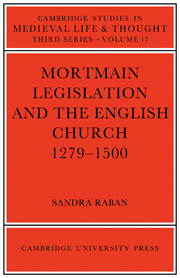Book contents
- Frontmatter
- Contents
- List of graphs and tables
- Preface
- List of abbreviations
- INTRODUCTION
- 1 THE STATUTE OF 1279 AND ITS ANTECEDENTS
- 2 THE WORKING OF THE STATUTE
- 3 ENFORCEMENT OF THE STATUTE
- 4 MANIPULATION OF THE STATUTE
- 5 PATTERNS OF ECCLESIASTICAL ACCESSION
- 6 THE IMPACT OF MORTMAIN LEGISLATION ON THE CHURCH
- CONCLUSION
- Appendix: The Statute of Mortmain 1279
- Bibliography
- Index
6 - THE IMPACT OF MORTMAIN LEGISLATION ON THE CHURCH
Published online by Cambridge University Press: 05 March 2012
- Frontmatter
- Contents
- List of graphs and tables
- Preface
- List of abbreviations
- INTRODUCTION
- 1 THE STATUTE OF 1279 AND ITS ANTECEDENTS
- 2 THE WORKING OF THE STATUTE
- 3 ENFORCEMENT OF THE STATUTE
- 4 MANIPULATION OF THE STATUTE
- 5 PATTERNS OF ECCLESIASTICAL ACCESSION
- 6 THE IMPACT OF MORTMAIN LEGISLATION ON THE CHURCH
- CONCLUSION
- Appendix: The Statute of Mortmain 1279
- Bibliography
- Index
Summary
The availability of licences to alienate in mortmain after 1280 raises the possibility of assessing the impact of the legislation on the church over a long period of time. But, as is so often the case when records are used for purposes other than those for which they were designed, there are pitfalls for the unwary. The chief disadvantage attaching to licence evidence is its resistance to statistical treatment except in the most rudimentary way. In calculating the number of licences granted in any one year, arbitrary decisions have to be made as to inclusion. This is especially true of the early years after the statute, before a common form was firmly established. Since the overriding concern in compiling the graphs for this study has been the pattern of accessions in the late medieval period, royal grants of land and rent which were not couched as licences have nonetheless been included, while vacated entries (except where they relate to general licences vacated upon completion), confirmations of land already held in mortmain, cash grants and exchanges have all been left out. Grants to borough corporations, which were few in number, have however been included and pardons for illicit acquisition have been recorded separately. Even with these criteria clearly defined, the scope for individual discretion remains such that no two scholars are likely to arrive at exactly the same figures, although the discrepancies should not be great enough to promote disagreement as to broad trends.
- Type
- Chapter
- Information
- Mortmain Legislation and the English Church 1279–1500 , pp. 153 - 186Publisher: Cambridge University PressPrint publication year: 1982

